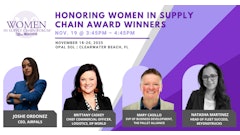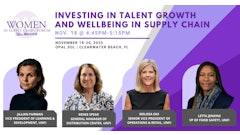
Supply chain professionals have gone from working behind-the-scenes to being in one of the most talked about industries of 2021. With limited labor, increasing disruption and surging production and shipping costs causing shortages around the globe, exploring a career in sourcing and procurement has taken on new meaning as the field becomes more critical and complex than ever before.
Sourcing professionals are not only helping organizations to grow, but are also making a real impact on both a local and global level. For example, by understanding who and what they buy from, sourcing and procurement professionals can promote a healthy work culture up and down the entire organization. Sourcing and procurement can also be a catalyst for diversity and inclusion by purposefully procuring more from diverse suppliers.
Itching to get started in sourcing and procurement? Here’s what it will take.
The industry and where it’s heading
The role of chief procurement officer (CPO) was relatively minor 15-20 years ago. In fact, when the title CPO was first created, it was written as cPO. But, it is now a major player for many organizations, especially with COVID-19-related shortages putting a spotlight on the supply chain. Whether it’s the shortage of appliances at your local store or the lack of toilet paper on store shelves, you can’t turn on the news or read a website without seeing a supply chain headline.
Third-party risk management is another priority that wasn’t top of mind a couple of decades ago. Technology may have blessed the industry by giving procurement a global view of all suppliers, but it has also put more pressure on the industry by uncovering unethical practices of suppliers, like modern slavery and conflict minerals, in addition to the massive amount of cyber activity that can be introduced through your suppliers. These are risks that the industry did not have visibility into 20 years ago.
It is now upon sourcing professionals to be aware of what’s going on in the world to address these risks. A procurement professional could literally destroy an organization through either who they buy from or what they buy if they don’t know about the global events that affect the industry and their role in it.
A thirst for knowledge
Those who thrive in sourcing and procurement have a natural curiosity. “Been there, done that, done,” is not in their DNA. In fact, the learning curve is what really drives most people in this industry. You must be the kind of person who looks at world events and makes the linkage to how they might impact your commodities or services that you source. You must be the kind of person who asks in-depth questions about why specifications are the way they are written -- are specs a result of layers and layers of additional engineering, or are they able to be unpeeled like an onion and reworked? Without this kind of natural curiosity, you will miss so many opportunities.
You can apply incredible knowledge from what you learn about one business to another and from one industry to another. You suddenly gain this incredible in-depth knowledge about something you never knew about before every time you source a new category for the first time.
Even if you don’t want to stay in sourcing and procurement long term, it provides an incredible opportunity to get to know a business from start to finish. It is one of the few roles offered in any industry where you get to see across every single business unit throughout the entire organization (e.g., operations, capital projects, human resources and more).
Because of this, a career in sourcing and procurement teaches critical skills necessary to be successful. For example, you can learn all the hard skills needed to run a business, such as business and financial acumen. On the softer skills side, you’re gaining experience with change management, communications and leadership responsibilities.
Not to mention you get to hone your selling skills since you’re selling your solutions up, down and across the entire organization. This enables you to learn the language of the executives and what drives them and learn the language of the workers and what drives them.
The result? You can take this knowledge with you anywhere in an organization. For example, successful sourcing people can move over to operations because they’ve gained hands-on, intimate information about that role.
The power of certifications
Strategic sourcing is not the same as simply shopping on a website. It takes a lot of critical thinking, analysis and a lot of asking, “what if we did something differently; what if we redesigned a specification; what if we looked to source in a new location?”
Certifications provide a unified global language of sourcing to help you answer those questions. The basics of contract law, understanding of sourcing methodology, such as total cost of ownership and how to design effective performance measures and indicators, are skills not usually taught in formal education or learned through experience in other business operations.
It is never too late to fall in love with sourcing and procurement. But, the most powerful way to find a job, make an immediate impact and become well-versed in the trade is with a certification.
It is so easy to become passionate about sourcing and procurement once you understand it. If you’re naturally curious about the way the world works and have a passion to be a champion for change, sourcing and procurement is the perfect career for you. If you want to get started, enroll in a certification program, reach out to your network to see what jobs are available, and most importantly, stay curious.


![Pros To Know 2026 [color]](https://img.sdcexec.com/mindful/acbm/workspaces/default/uploads/2025/08/prostoknow-2026-color.mduFvhpgMk.png?auto=format%2Ccompress&bg=fff&fill-color=fff&fit=fill&h=100&q=70&w=100)







![Pros To Know 2026 [color]](https://img.sdcexec.com/mindful/acbm/workspaces/default/uploads/2025/08/prostoknow-2026-color.mduFvhpgMk.png?ar=16%3A9&auto=format%2Ccompress&bg=fff&fill-color=fff&fit=fill&h=135&q=70&w=240)






